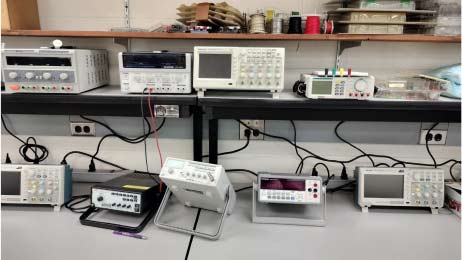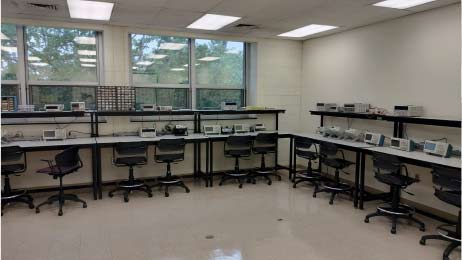Electrical and Electronics Laboratory (Room: Tech 209)
Future of innovation and learning
The Electrical and Electronics Laboratory is a state-of-the-art facility dedicated to advancing hands-on education, research, and innovation in the fields of electrical and electronic engineering. The lab is located in the room, Tech 209, on the first floor of a Tech building. The lab offers students, researchers, and faculty members access to cutting-edge tools, practical training opportunities, and a collaborative environment that bridges the gap between theory and real-world applications.
The current lab facility is committed to nurturing the next generation of engineers by offering a platform that combines traditional experimental methods with modern technological advancements.
Our facilities and offerings
Lab features
- Fully equipped workstations: Each workstation includes function generators, digital multimeters, oscilloscopes, power supplies, and a breadboard.
- Modern safety systems: A primary health care kit is hung near the lab’s entry door. Safety is our top priority. A safety briefing is conducted before starting the lab activity.
- Software and simulation tools: The lab supports simulation tools such as Multisim and Automation Studio, which allow students to analyze designs before implementation.

Equipment highlights
The equipment and the components available in the Tech 209 are shown in Fig. 1.
- Digital and Analog Oscilloscopes
- Function Generators (1 MHz to 20 MHz)
- DC Power Supplies (0-30V, Dual-Channel)
- Breadboards, Resistors, Capacitors, ICs, and discrete components
Educational objectives
Our laboratory plays an integral role in a wide range of undergraduate and postgraduate courses, including:
- Network Analysis I
- Network Analysis II
- Analog Electronics
- Digital Electronics
- Power Electronics
Students engage in both structured lab experiments and gain hands-on experience in designing, assembling, and troubleshooting real-world circuits and systems in the Tech 209 room, as shown in Fig. 2
Research activities
This lab and Tech 212 jointly support the following research activities:
- Grounding Systems
- Power System Stability Analysis
- Modelling of Power Systems with Renewable Energy
- Motor Control with Power Electronics Devices
- Relay Characteristics

For more information, contact
Abdus Salam, Ph.D.
Associate Professor, Department of Electrical Engineering
- Phone203-576-4157
- Faculty Profileprofiles.bridgeport.edu/user/salammd/
